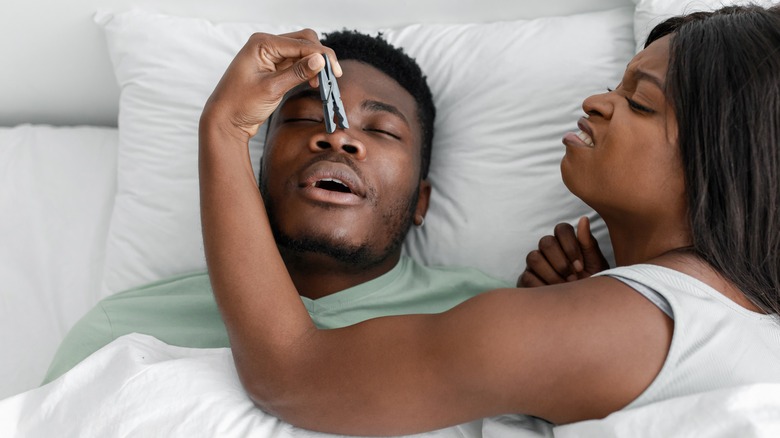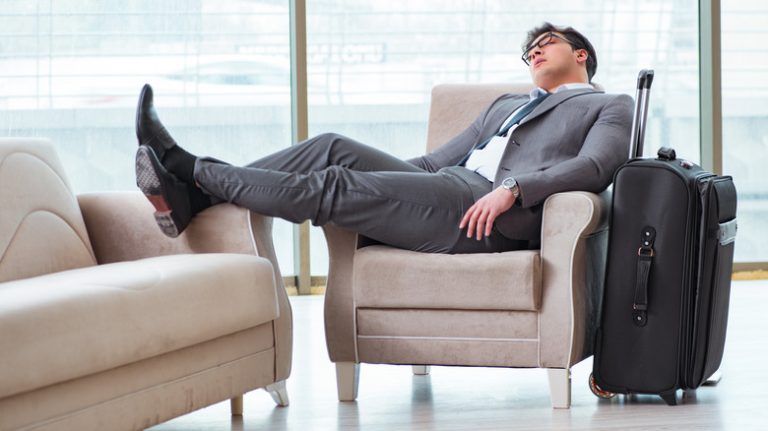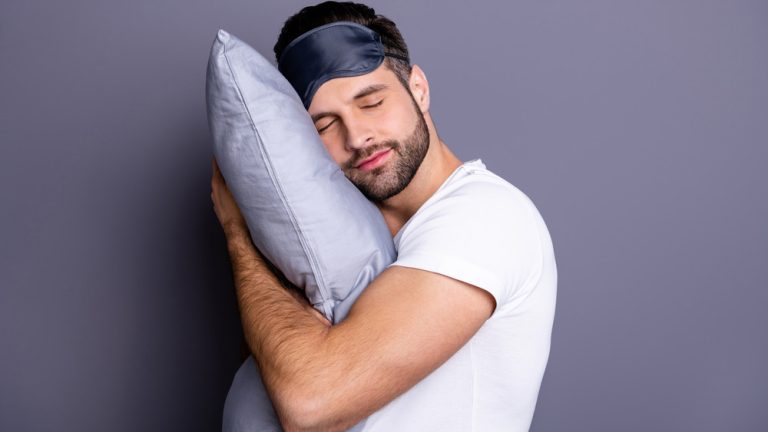Some of the things that contribute to snoring, you can’t do anything about. Being male and being middle-aged, statistically speaking, are a couple of examples. Still, there are plenty of things you can try to minimize or eliminate snoring on other fronts; some are common sense, and others may cause you to scratch your head at first. (Tennis balls and vibrators come to mind for the latter, but that’s a bit of a spoiler.)
Snoring is that rasping, snuffling, snorting sound you may experience when you fall into a deep sleep and the muscles in your mouth, tongue, and throat relax. Sagging tissue partially blocks your airway, causing it to vibrate as you breathe. The more resistance in the airway, the louder you snore. About 40% of adult men and 24% of adult women snore regularly (via University of Utah), although men typically snore less after they reach age 70.
For some people, snoring is just annoying and embarrassing. For others, it may be a symptom of a health condition that needs medication attention, such as obstructive sleep apnea. Either way, most people would do something about it if they could only find a trick that worked.
Change your sleeping position to silence your snores

If you tend to snore, it’s best to avoid sleeping on your back. That’s because gravity pulls the tissue in your tongue and throat downward while you sleep, constricting your airway and leading to snoring.
Try sleeping on your side instead. Techniques for keeping yourself from rolling on your back (via VeryWell Health) include wearing a nightshirt with balls sewn into the back, which makes it uncomfortable to lie supine, or using a wearable vibrator that alerts you when you roll over. Regular pillows placed behind your back, or a body pillow made specifically for the purpose, are other ways to keep you on your side.
One study (via Sleep and Breathing) showed that elevating your head a few inches can also help ease snoring. You can accomplish this with an adjustable bed or by placing risers at the upper end of your regular bed. Using a wedge pillow or sleep apnea pillow will also do the trick.
Skip alcohol near bedtime to curb snoring

Drinking alcohol can relax the muscles of your mouth, nose, and throat to the point that your airways are at least partially blocked, according to the Center for TMJ & Sleep Apnea. Breathing through the restricted airways causes snoring, and the more you drink, the more likely you are to snore — and the louder your snores will be.
Numerous studies have shown that alcohol disrupts quality sleep, reports WebMD. While alcohol may help you fall quickly and deeply asleep for the first part of the night, you’re likely to wake up frequently and miss out on important rapid eye movement (REM) sleep. REM sleep begins about 90 minutes after you start sawing zzz’s and is considered key to helping your body restore and refresh itself during the night. Missing out on some of that sleep may cause you to feel fatigued and have trouble focusing the next day. And if you’re overtired, you may even sleep deeper, relax further, and snore more the following night as well — a result of what the Sleep Foundation calls “rebound sleep” that moves you even further from your stop-snoring goal.
Avoid sedatives to decrease the likelihood of snoring

fizkes/Shutterstock
The purpose of sedatives such as sleeping pills (via Medical News Today) is to help you feel less anxious and more relaxed. The downside when it comes to snoring is that they relax your whole body, including those all-important muscles in your mouth, tongue, and throat that keep your airway open while you sleep. Plus, if they’re doing their job and inducing deeper sleep, that might mean further relaxation and an increased risk of snoring.
Sedatives are central nervous system depressants that activate gamma-aminobutyric acid (GABA), a neurotransmitter that inhibits brain activity. Commonly used sedatives include barbiturates, benzodiazepines, and non-benzodiazepine sleep medications — also known as Z-drugs because they’re used to treat sleep disorders. Antihistamines, muscle relaxants, antidepressants, and antipsychotics can also have sedating effects, whether they’re used for sleep management or to address another condition.
If possible, it’s best to avoid using sedatives at night, but don’t stop taking a prescribed medication without talking to your doctor. If you do take sedatives, be sure to tell your doctor if you experience worrisome side effects such as memory loss, slurred speech, depression, feeling like you’re becoming dependent on them, or thoughts of harming yourself.
If you or anyone you know is having suicidal thoughts, please call the National Suicide Prevention Lifeline at 1-800-273-TALK (8255).
Unclog your nasal passages to silence snoring
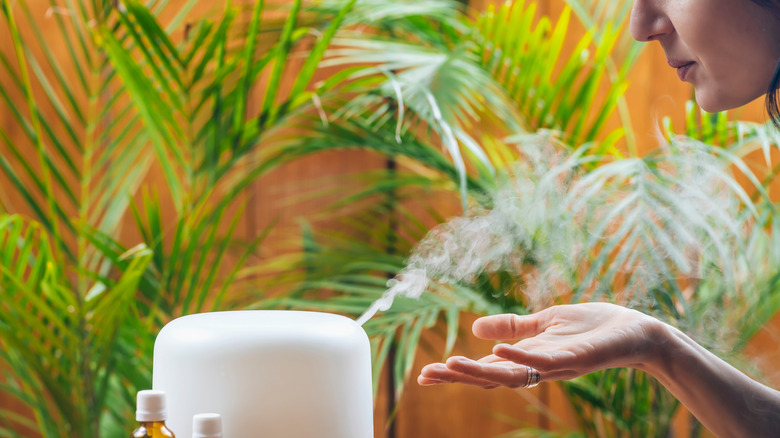
Microgen/Shutterstock
If your nose is feeling stuffy at bedtime, there’s a good chance you’re going to snore once you fall asleep. Congestion is caused by swollen blood vessels in your nasal passages, often the result of allergens, pollution, or dry air. When your nasal passages swell due to irritation, airflow is naturally restricted.
Luckily, there are some easy and soothing ways to clear congestion so you breathe and sleep easier. Taking a hot shower and inhaling plenty of steam helps congestion drain, and even breathing steam from hot water in the sink may help. Irrigating your nasal passages using a neti pot can remove irritants that are causing congestion, and spraying a thin mist of saline solution in your nostrils may also be helpful to clear out mucus. You can also ease congestion and earn yourself some quiet zzz’s by running a humidifier or vaporizer in your bedroom to add moisture to the air.
Even dietary supplements have the potential to help! One study published in BMC Complementary Medicine and Therapies showed that consuming ginger extract was effective in minimizing allergy-related congestion.
Rid your bedroom of allergens to prevent snoring
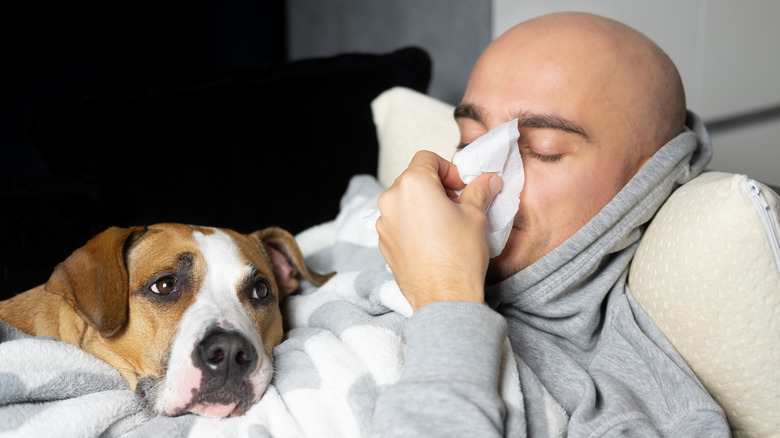
Aleksey Boyko/Shutterstock
Dust, dust mites, dead skin, and pet dander are some of the indoor allergens that can cause congestion, tight airways, and snoring, according to Ear, Nose & Throat of Georgia. To minimize allergic symptoms, thoroughly and frequently clean your bedroom from top to bottom, wash your bedding in hot water weekly, and — heartbreaking though it may be — keep pets out of your bedroom and bed.
Also, don’t forget that you and your pets carry outdoor allergens inside with you all the time, says Cleveland Clinic allergist Sandra Hong, MD. “If you have pets, they’re covered in pollen. So once you bring them in, and you’re hugging on them, you’re definitely going to have pollen indoors,” she says. To mitigate this effect, bathe pets frequently, and take a shower before going to bed to rinse allergens off yourself as well. Using a saline spray to bathe and soothe your sinuses, as well as keeping the windows and doors of your home closed during allergy season, can also help minimize allergies and the resultant snoring.
Try a snoring app to monitor your nighttime noises

Stokkete/Shutterstock
If you can’t believe that you snore — or that you snore as bad as other people claim — a snoring app could be just what you need. According to the American Sleep Association, apps can record your snores and analyze their severity.
In addition to proving to yourself, once and for all, that you don’t snore (or do), an app may help you track which of the remedies you’re trying are working, and which are working best. Apps are available for iPhones and Androids, many free or under $10. Some offer sounds to soothe you while you sleep, and others emit a sound or vibration to alert you that you’re snoring.
More research is needed on the accuracy and effectiveness of anti-snoring and sleep apps compared to traditional sleep studies, says the Sleep Foundation. Still, you may find that an app empowers you to gather preliminary data on your sleep habits and to experiment with which additional remedies help quiet your snores.
Maintain a healthy weight to minimize snoring
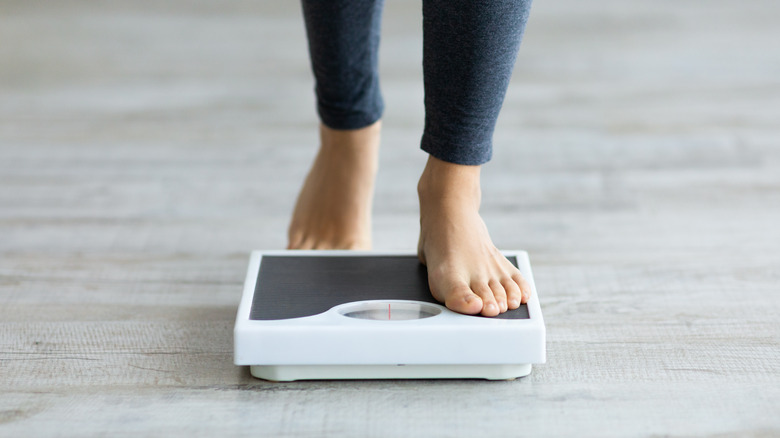
Prostock-studio/Shutterstock
According to the Cleveland Clinic, a healthy body mass index (BMI) falls between 18 and 25. BMI is just one screening tool to determine overall health, and sometimes it’s not even the best or clearest tool for that job (like when an individual with a lot of muscle registers as overweight). However, if your BMI is within what’s considered the healthy range, you can probably cross weight loss off your list of possible snoring cures.
If your BMI is above 25, it’s possible that extra tissue around your neck is compressing your airway while you sleep (via The Sleep Foundation). Also, the extra abdominal weight may be limiting your lung capacity, making it harder to breathe. To calculate your BMI, multiply your weight in pounds by 703, then divide that answer by your height in inches squared (or use an online tool like the CDC’s).
If you find that your BMI is higher than 25, there’s still good news: Research cited by VeryWell Health shows that losing an average of just 6.6 pounds can significantly improve snoring, and losing even more weight may eliminate snoring entirely. Just be mindful that weight loss isn’t right for everyone, and you should always discuss major lifestyle changes with your doctor in order to pursue them safely.
Quit smoking to help banish snoring
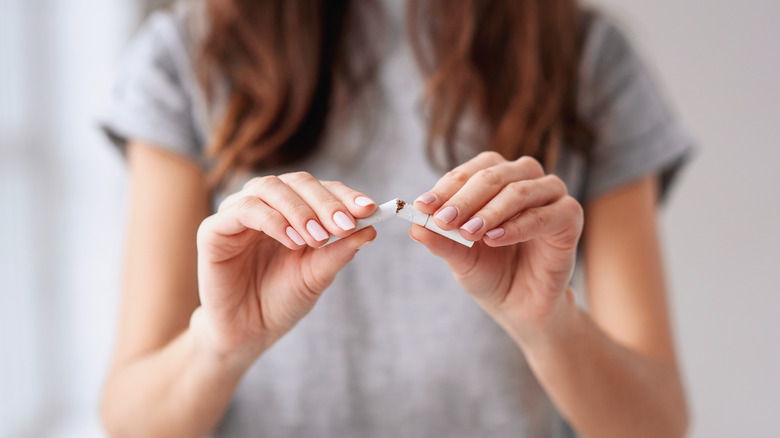
Gorynvd/Shutterstock
Whether you smoke cigarettes, cigars, or pipes, inhaling smoke can cause inflammation in your airways (via VeryWell Health), narrowing them and contributing to snoring. Research shows that current smokers are two to three times more likely to snore than nonsmokers, and the amount you smoke seems to increase your risk of snoring. For example, if you smoke multiple packs a day, you’re more likely to snore than someone who only smokes a couple of cigarettes now and then — but even a little bit of smoking can increase your likelihood of snoring because of its potential to cause inflammation.
Curbing your snores may be just the incentive you need to finally quit smoking, and the benefits extend far beyond quieting your snores, according to Medical News Today. Within just 12 hours of giving up smoking, your heart rate and blood pressure drop and your oxygen levels increase. After a day, your risk of heart attack is reduced, and in two days your sense of smell and taste may begin to improve. Lung capacity starts increasing after about a month, and after 9 months, your lungs will be virtually healed from their tobacco use, making breathing easier and potentially decreasing your snores. Sure, there are quicker ways to manage your snoring, but smoking cessation is a bonus approach because it offers so many significant, long-term rewards.
Consume plenty of fluids to ease snoring

Mladen Mitrinovic/Shutterstock
Daniel P. Slaughter, M.D. compares snoring to what happens in a hose (via WebMD). “Imagine a narrow garden hose with water running through. The narrower the hose, the faster the water rushes through.” Dr. Slaughter, an otolaryngologist and snoring expert at Capital Otolaryngology in Austin, Texas, says the movement of air through the nasal passages works similarly. When the fluids in your nose, mouth, and throat area become stickier as a result of dehydration, you may find yourself snoring more because the “hose” (your airway) is obstructed.
To stay hydrated, some health experts recommend drinking eight 8-ounce glasses of water a day for optimal health. The Mayo Clinic says water needs vary depending on factors like the climate where you live, how much you exercise, and your overall health. Most people can get plenty of fluids just by drinking water whenever they are thirsty. Drinking any beverage (not just water) and eating fruits and vegetables that contain a large percentage of water, like melons and leafy greens, will also help you and your nasal passages stay hydrated — and minimize your snores.
Practice good sleep hygiene to minimize snoring

vetre/Shutterstock
If you’re overly tired when you go to bed, you may sleep more deeply, making the muscles in your mouth, tongue, and throat relax even more than usual. That saggy tissue has the potential to narrow your airway and contribute to snoring. Most adults need at least eight hours of sleep a day, according to WebMD. However, some people do fine with six or fewer hours of sleep daily, and others require about 10 hours to be at their best. Experimenting to find out your own sweet spot could serve you well!
Practicing good sleep hygiene means developing healthy habits that keep you well-rested. The American Academy of Sleep Medicine recommends going to bed early enough that you get plenty of sleep; try to go to bed and get up at the same time every day, no matter what your plans are for that day or the following. Avoiding caffeine, alcohol, and large meals near bedtime can help you sleep better as well, and a relaxing bedtime routine, including turning off electronic devices and keeping your bedroom quiet, dimly lit, and on the cool side, can help you transition to restful zzz’s and potentially less snoring.
Exercise your mouth, tongue, and throat muscles to lessen snoring

Roman Samborskyi/Shutterstock
Saggy tissue in your mouth, tongue, and throat contributes to snoring, so it makes sense that toning those muscles so they’re better able to keep your airway open while you sleep may quiet your snores. Research in the journal Chest confirms that exercises may be helpful, and the Sleep Foundation offers a variety of interesting and even fun exercises to try.
Sliding your tongue from your front teeth backward along the roof of your mouth, sticking out your tongue and trying to touch your chin, and pressing your tongue against the roof of your mouth and holding it there are a few ways to strengthen your tongue. You can also practice breathing through your nose, repeating vowel sounds, and singing to engage and strengthen muscles in your nose and throat. While these exercises may seem silly, the Sleep Foundation reports that there are no physical downsides, and if the exercises help open your airway and quiet your snores, they may be worth the funny faces.
Explore anti-snoring products and devices
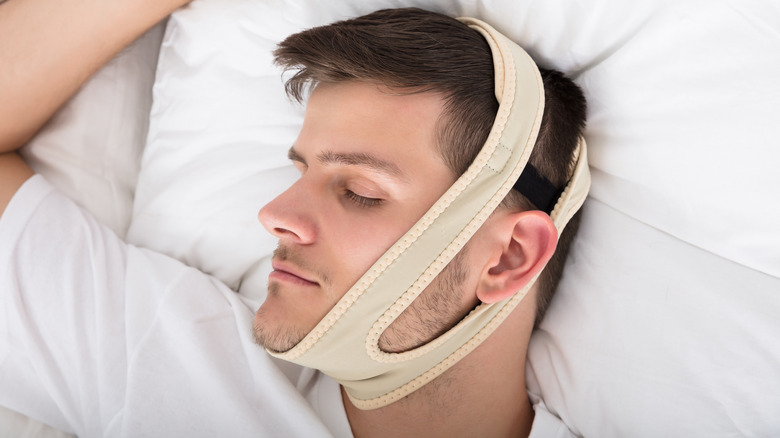
Andrey_Popov/Shutterstock
A vast array of over-the-counter (OTC) anti-snoring products are available that may or may not help quiet your snoring. “In choosing an OTC product, it helps to understand if nasal congestion is a problem –- people with nasal congestion are often congested by day, and worse at night,” says Menlo Park Psychiatry & Sleep Medicine founder Alex Dimitriu, M.D. to VeryWell Health. Adhesive nasal strips that keep the nasal passages open may help, or a Snorepin, which features hollow, vented pins that fit inside your nose to hold it open. Both of these options are accessible and affordable.
If breathing through your mouth, or the anatomy of your throat or tongue, is causing your snoring, a chin strap that keeps your mouth from dropping open while you sleep may be a good option, says Dr. Dimitriu. A mandibular advancement splint, or snore guard, which holds your lower jaw in position (likely further forward than it falls naturally) and keeps your airway open, may also be helpful, according to the American Sleep Association. But always do your research on any product you choose; mouth guards, for example, are not the same as snore guards and may increase snoring rather than decrease it.
Be on the lookout for signs of sleep apnea
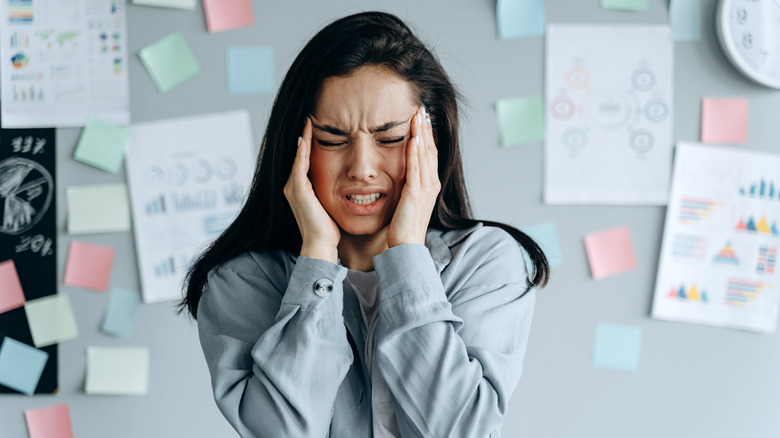
Maples Images/Shutterstock
Your snoring may be just annoying, embarrassing, and frustrating, but if you experience other symptoms along with it, you may have sleep apnea, a condition where your airway closes or contracts and you actually stop breathing multiple times while you sleep. According to the Mayo Clinic, signs that obstructive sleep apnea (OSA) is the cause of your snores start at night: Your snores are especially loud, and you may find yourself waking up gasping for air, or with chest pains. Disturbed or inconsistent sleep is another indication of possible OSA.
Daytime signs of sleep apnea may include waking up with a sore throat, a dry mouth, or a headache, along with feeling drowsy after a full night’s sleep, being irritable, and having a short attention span or trouble concentrating. WebMD reports that sleep apnea increases your risk of high blood pressure, diabetes, heart disease, and depression. What’s more, you’re five times more likely to have car accidents if you have sleep apnea.
In this case, snoring might just be the tip of the iceberg, and a trip to the doctor might not only help you eliminate the annoying habit, but save your life.
See your doctor if snoring persists

Studio Romantic/Shutterstock
If you’re still snoring after trying some, most, or all of these stop-snoring suggestions, and you think you may have sleep apnea, it’s time to see your doctor. Sleep apnea diagnosis will most likely include reviewing your medical history and checking your jaw structure, the position of your tongue, and any obstructions in your throat. Your doctor also may do a blood test and even an ultrasound to rule out other conditions that may be contributing to your snoring. If sleep apnea seems to be the likely cause of your snoring, an overnight sleep study in a lab or at home may be ordered to determine what type of sleep apnea you have and the severity of the condition.
Once sleep apnea is diagnosed, a continuous positive airway pressure (CPAP) machine is often prescribed that pumps humidified air through your nose and keeps your airways open while you sleep. If a breathing device or an oral mandibular advancement device doesn’t quiet your snoring, other treatments may be recommended, such as a tonsillectomy or a procedure to reposition your jaw further forward. There are also surgical implants available that stimulate the muscles in your mouth, tongue, and throat to keep your airway unobstructed. These may seem like drastic measures, but they could improve your quality of sleep (and life) if nothing else has worked.

